Papers by Jacek Abramczyk
Lecture notes in civil engineering, Oct 25, 2023
Budownictwo i Architektura, Sep 28, 2023
Journal Biuletyn of Polish Society for Geometry and Engineering Graphics, 2001
Materials, Dec 14, 2022
This article is an open access article distributed under the terms and conditions of the Creative... more This article is an open access article distributed under the terms and conditions of the Creative Commons Attribution (CC BY
Building and Environment, 2022
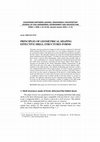
Journal of Civil Engineering, Environment and Architecture, 2014
The paper concerns geometrical shaping of shell structures composed of individual shells arranged... more The paper concerns geometrical shaping of shell structures composed of individual shells arranged effectively in space that is in a way similar to properties of a regular, geometrical surface with taking into account straight lines and planes normal to the base surface. The individual segments are made up of unidirectional folded flat sheets transformed into shell shapes. A freedom of transversal width increments of these sheets is assured while transforming, which ensures their possible small effortsuch a deformation of a material intended for transferring functional loads but which makes restrictions concerning the shell sheets shapes. These shape restrictions are provoked by the strictly determined stiffness characteristics of the shell sheets and cause of the edge or discontinuous areas between adjacent shellssegments in the shell structure. The method of delimiting great diversity of effective, compound shell forms whose general shapes are close to regular, geometrical surfaces characterized by any sign of the Gaussian curvature is presented. Innovation of the way also consists in integration of the form of a whole building object (walls and shell roof). It is achieved by division of the elevation walls into flat areas contained in planes close to planes normal to the base surface as accurate as possible. The segment's directrices are also contained in these planes. The presented issues are the ground for elaborating a method of shaping of the light gauge steel shell structures and their further integration with whole building objects.
Procedia Engineering, 2016
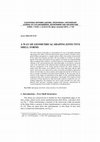
Journal of Civil Engineering, Environment and Architecture, 2015
The main content of the paper is a presentation of a way of arranging individual light gauge stee... more The main content of the paper is a presentation of a way of arranging individual light gauge steel shells in the three-dimensional space to obtain a structure whose general shape corresponds to a regular surface called a base surface characterized by any sign of the Gaussian curvature. The way enables us to achieve: a) an integration of the shape and locations of any number of elements of a shaped building object including walls, windows, roof shell stripes by a diversification of their inclination to the vertical direction and a horizontal plane, b) an effective structural work of the shell folds of the deformed sheets producing individual shells, c) an effective arrangement of the stripes passing crosswise the whole structure by means of the base surface, d) an effective cover of the shell strips with the shell sheets. These aims were achieved by means of auxiliary polyhedral compositions whose side and edges are close to planes and straight lines normal to the base surface as accurate as possible at the point chosen initially. In the next stage, the directrices of the stripes are determined on the planes of this controlling structure composed of the above auxiliary compositions. The models of the stripes are fixed on the base of these directrices so that each model would be contained in one controlling composition. The proposed way can be easily extended over more complicated shell structures, including segment shell structure, characterized by a great integration of any number of elements of a building object.
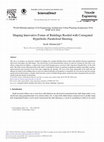
Procedia Engineering, 2016
The aim is to propose an innovative method of shaping free original building forms roofed with pr... more The aim is to propose an innovative method of shaping free original building forms roofed with profiled sheeting transformed effectively from plane into shell shapes. The effectiveness of the transformation consists in effective twisting of each fold, so its effort is minimized. In addition, a contraction of each shell sheeting passes crosswise fold's directions through halves of the shell folds. The effort of the subsequent folds in the shell is controlled by means of auxiliary tetrahedrons making it possible to adopt a mutual position and curvature of two skew lines supporting the sheeting. The way of the shape integration of the shell roof and oblique elevations in the building form as well as its natural and built environments is considered. the way may be used for creating spatial network determining a complex shell roof and a system of folded oblique plane-walled elevations integrated with each other and the built and natural environments.
IOP Conference Series: Materials Science and Engineering, 2019

An innovative method for shaping attractive architectural free forms of buildings is proposed. Co... more An innovative method for shaping attractive architectural free forms of buildings is proposed. Consistency of shell roofs and plane-walled oblique elevations of the building free forms is preserved due to utilization of specific geometrical tetrahedrons controlling general forms of entire buildings. The method proposed enables shaping roofs as warped shell forms made up of plane steel sheets folded in one direction and connected to each other along their longitudinal edges to obtain a plane strip. Next, the strip is elastically transformed into a shell shape so that a freedom of the width increments of each shell fold would be ensured. Such effective sheet shape transformations make it possible to limit the negative influence of these initial fold's shape changes on the strength and stability of the designed roof shell. The method also allows to shape oblique plane elevation walls almost freely both individual buildings and their complex structures.
IOP Conference Series: Materials Science and Engineering, Feb 24, 2019
Architecture, Civil Engineering, Environment
The paper attempts to demonstrate the potential applications of mental maps in sociological resea... more The paper attempts to demonstrate the potential applications of mental maps in sociological research of the city. The author presents the method and its modification. Beginning with the classical work by Kevin Lynch, he proceeds to show the elaboration of this method in the research of psychologists, social geographers and urbanists. The subsequent part of the paper discusses the possibilities of applying the method in sociological research of the city. The author demonstrates the wide range of possibilities offered by the use of mental maps. The final chapter includes a summary of the advantages and disadvantages of this method.
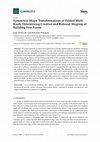
Symmetry, Nov 22, 2019
The paper presents an innovative approach to solving interdisciplinary problems emerging in the d... more The paper presents an innovative approach to solving interdisciplinary problems emerging in the design process of building free forms roofed with elastically transformed corrugated shells. The effectiveness and rationality of shaping such free forms and the creativeness in searching for the parametric forms require the application of their regular and symmetric models which have to be derived from the geometric and mechanical properties of the rationally transformed subsequent folds of these shells. Simplified smooth models used for engineering developments and accurate folded models implemented for scientific research have to be created by means of unconventional methods different from those presented in classical courses. Owing to the variety of the forms of the proposed innovative reference tetrahedrons and their parametric description, the algorithms developed by the authors have to be implemented in computer programs. The rationality of the transformed roof shells, revealed in the limitation of the level of the fold's initial stresses resulting from the shape transformation, and the attractiveness of these forms are achieved by the axial symmetry and contraction of each shell fold at its half-length. The symmetries adopted in the process of modeling such roof shells are also exploited by the discussed new method to obtain coherent unconventional general forms of entire buildings.
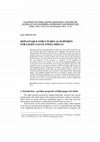
The paper concerns using deployable bar structures as basic parts of structural systems of light ... more The paper concerns using deployable bar structures as basic parts of structural systems of light gauge steel compound shells. Applying such structural systems should improve the shells assembly because of exploiting: a) planes and nodes appointed by pairs of intersecting bars to set directrices of their individual shells, b) prefabrication of their structural systems. Thus, the main aim of using the deployable bar structure is to get the ends of its bars at the expected nodes after lying it out but not continuity of this structure or constancy of the positions of the flexible joints on the length of its bars during unfolding/unfolding. Such a structure has not to let itself fold to a linear shape and unfold to a planar one. The presented issues are a ground for studying a method of shaping light gauge steel shells supported with the changeable bar structures, which allows for creating free and original shell forms. In the paper, the author applies auxiliary, conceive and continue te...
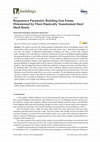
The article concerns the unconventional architectural forms of buildings roofed with transformed ... more The article concerns the unconventional architectural forms of buildings roofed with transformed shells made up of thin-walled steel fold sheets, and a parametric description of how they are shaped. Complicated deformations of flanges and webs, as well as the complex static–strength work of the folds in a shell roof, demand the creation of simplified models regarding the parameterization of such shells and their integration with the general forms of the buildings. To obtain favorable results, it was necessary to write computer applications because of both the complicated problems related to the significant limitations of the transformations, as well as the great possibilities of shaping shell roofs by means of directrices of almost free shape and mutual position. The developed procedures enable the prediction of shapes and states of all the folds in the designed shell. They take account of two basic conditions related to these restrictions, which guarantee that the folds encounter l...
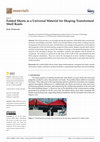
This article provides a novel insight into specific properties of flat folded sheets transformed ... more This article provides a novel insight into specific properties of flat folded sheets transformed elastically into building roof shells. Elastic twist transformations of the sheets resulting from the arrangement of the sheets on two skew roof directrices cause changes in the geometric and mechanical sheet properties of the roof shell sheeting composed of these sheets. Regular smooth-ruled surfaces and their characteristic lines are used in the analysis of changes in the geometric properties. In the analysis of the mechanical changes, the constitutive relations and complex state of stresses are considered. The analysis is carried out on the basis of the results of the experimental tests and FEM computer simulations. They have led to the development of such a method of shaping of the effectively transformed folded covers that ensures the initial effort of each shell fold to be the smallest possible.
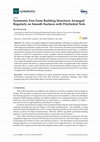
The article is an original insight into interdisciplinary challenges of shaping innovative unconv... more The article is an original insight into interdisciplinary challenges of shaping innovative unconventional complex free form buildings roofed with multi-segment shell structures arranged with using novel parametric regular networks. The roof structures are made up of nominally plane thin-walled folded steel sheets transformed elastically and rationally into spatial shapes. A method is presented for creating such symmetric structures based on the regular spatial polyhedral networks created as a result of a composition of many complete reference tetrahedrons by their common flat sides and straight side edges arranged regularly and symmetrically in the three-dimensional Euclidean space. The use of the regularity and symmetry in the process of shaping different forms of (a) single tetrahedral meshes and whole consistent polyhedral structures, (b) individual plane walls and complex elevations, (c) single transformed folds, entire corrugated shell roofs, and their structures allow a creati...








Uploads
Papers by Jacek Abramczyk